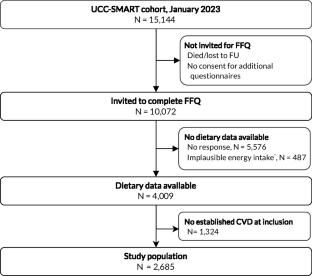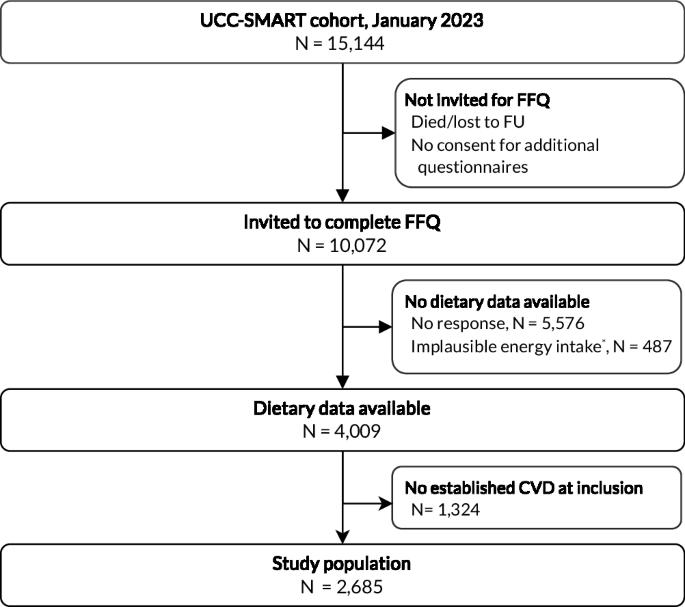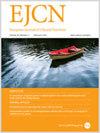Dietary habits and compliance with dietary guidelines in patients with established cardiovascular disease
IF 3.6
3区 医学
Q2 NUTRITION & DIETETICS
引用次数: 0
Abstract
Unhealthy dietary habits are an important risk factor for cardiovascular disease (CVD) and adopting a healthy diet is a central recommendation in CVD prevention. This study assessed the dietary habits of patients with established CVD, their compliance to dietary guidelines, and the relationship between guideline-compliance and recurrent cardiovascular event risk. 2656 patients with established CVD from the Utrecht Cardiovascular Cohort-Secondary Manifestations of ARTerial disease (UCC-SMART) prospective cohort study, were included between 1996 and 2022. Data on dietary intake was retrospectively collected for all participants in December 2022 using a 160-item food frequency questionnaire. Compliance with dietary guidelines was quantified using an amended version of the Dutch Healthy Diet 2015 (DHD-15) index (range: 0–135). Cox proportional hazard models were used to quantify the relationship with cardiovascular events (stroke and myocardial infarction). Among 2656 CVD patients (77% male, mean age 59 ± 9 years), median energy intake was 1922 [IQR: 1536–2351] kcal/day. The median DHD-15 index was 81.7 [IQR 71.2–92.0], with high compliance scores for recommendations on legumes and fish, and low scores for recommendations on whole grains, red meat, processed meat, and dairy. A higher DHD-15 score was associated with lower stroke risk (HR 0.78, 95% CI 0.66–0.92 per 10-point increase) but not with myocardial infarction. Compliance with dietary guidelines was suboptimal in patients with established CVD. High compliance was associated with a clinically significant reduction in stroke risk in patients with established CVD, emphasizing the importance of dietary counseling.


已确诊心血管疾病患者的饮食习惯和遵守饮食指南的情况。
背景:不健康的饮食习惯是心血管疾病(CVD)的重要风险因素,而采用健康饮食是预防心血管疾病的核心建议。本研究评估了已确诊心血管疾病患者的饮食习惯、他们对饮食指南的遵从情况以及指南遵从情况与复发性心血管事件风险之间的关系。方法:研究人员纳入了 1996 年至 2022 年间乌得勒支心血管队列-动脉疾病二次表现(UCC-SMART)前瞻性队列研究中的 2656 名已确诊心血管疾病患者。2022 年 12 月,研究人员使用 160 项食物频率问卷对所有参与者的饮食摄入数据进行了回顾性收集。膳食指南的遵守情况采用修订版的荷兰健康膳食 2015(DHD-15)指数(范围:0-135)进行量化。采用 Cox 比例危险模型量化与心血管事件(中风和心肌梗死)的关系:结果:2 656 名心血管疾病患者(77% 为男性,平均年龄为 59 ± 9 岁)的能量摄入中位数为 1922 [IQR: 1536-2351] 千卡/天。DHD-15 指数的中位数为 81.7 [IQR 71.2-92.0],豆类和鱼类的建议得分较高,而全谷物、红肉、加工肉类和乳制品的建议得分较低。DHD-15得分越高,中风风险越低(每增加10分,HR为0.78,95% CI为0.66-0.92),但与心肌梗死无关:结论:已确诊心血管疾病的患者对饮食指南的依从性并不理想。结论:已确诊心血管疾病的患者对膳食指南的依从性并不理想,而膳食指南的高度依从性与临床上显著降低已确诊心血管疾病患者的中风风险有关,这强调了膳食咨询的重要性。
本文章由计算机程序翻译,如有差异,请以英文原文为准。
求助全文
约1分钟内获得全文
求助全文
来源期刊
CiteScore
10.60
自引率
2.10%
发文量
189
审稿时长
3-6 weeks
期刊介绍:
The European Journal of Clinical Nutrition (EJCN) is an international, peer-reviewed journal covering all aspects of human and clinical nutrition. The journal welcomes original research, reviews, case reports and brief communications based on clinical, metabolic and epidemiological studies that describe methodologies, mechanisms, associations and benefits of nutritional interventions for clinical disease and health promotion.
Topics of interest include but are not limited to:
Nutrition and Health (including climate and ecological aspects)
Metabolism & Metabolomics
Genomics and personalized strategies in nutrition
Nutrition during the early life cycle
Health issues and nutrition in the elderly
Phenotyping in clinical nutrition
Nutrition in acute and chronic diseases
The double burden of ''malnutrition'': Under-nutrition and Obesity
Prevention of Non Communicable Diseases (NCD)

 求助内容:
求助内容: 应助结果提醒方式:
应助结果提醒方式:


